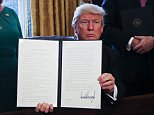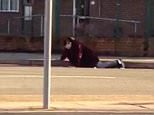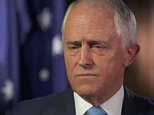Iranian baby is allowed into the U.S. for life-saving heart surgery after being blocked by Trump's travel ban
- Four-month-old Fatemeh Reshad will receive treatment in Portland
- The infant has two holes in her heart and needs the crucial procedure
- She and her family tried to enter the US but were denied under Trump's order
- They received an exemption and all travel, medical costs will be privately funded
An Iranian baby banned from entering the United States for life-saving heart surgery under President Trump's executive order will now be allowed to have the treatment.
The family of four-month-old Fatemeh Reshad had an appointment in Dubai to receive a US tourist visa.
But it was abruptly cancelled earlier this week after Trump announced his executive order on immigration, banning travel to the US by people from seven predominantly Muslim countries, including Iran.
Scroll down for video
Four-month-old Fatemeh Reshad was denied entry into the US for life-saving heart surgery under President Donald Trump's executive order
Fatemeh has two holes in her heart. Iranian doctors told the family that the infant needed at least one surgery, maybe several, to correct the serious heart defects, or she will die
Courtesy KOIN
So, Fatemeh and her family were forced to return home.
Lawyers had been seeking an exemption from the travel ban on the family's behalf, said Jennifer Morrissey, an attorney representing the Reshads.
Morrissey called the case 'an extremely poignant example of the impact of the ban'.
'It's probably the clearest illustration I can think of offhand of why the travel ban was poorly thought out, poorly executed and had significant humanitarian consequences', she said.
New York Governor Andrew Cuomo said he worked with the International Refugee Assistance Project to secure a waiver of Trump's order.
'Bizarrely, the federal ban would prevent this child from receiving medical care and literally endanger her life.
'It is repugnant to all we believe as Americans and as members of the human family', Cuomo said.
Fatemeh's uncle, Samad Taghizadeh, said she will die if she doesn't have the surgery soon
He plans on continuing to work with the organization 'to ensure this baby receives the treatment she needs, and fight for those being unfairly shut out of America’s gates by this policy'.
A law firm has agreed to cover the family's travel expenses, he added.
Iranian doctors told the family that Fatemeh needed at least one surgery, maybe several, to correct the serious heart defects, or she will die, said the infant's uncle, Samad Taghizadeh, a US citizen who lives in Portland.
In one night, everything changed for Fatemeh and her mother, Taghizadeh told KOIN6.
'It was very hard because she got the hope to come to [the] US, bring the baby here', he said.
Taghizadeh said Trump's actions against immigrants make him feel like he doesn't belong in the US.
'Because we’re born in Iran, it’s like he ignores me as a citizen. My niece is 4-months-old coming to here for surgery, you’re scared of her? What’s she going to do? Is she dangerous?'
New York Gov Andrew Cuomo helped secure a waiver of Trump's order on the family's behalf
The hospitals in Iran don’t have the right equipment to operate on Fatemeh, so her chance of success with surgery is significantly decreased.
Manhattan's Mount Sinai Medical Center had offered to perform the critical surgery for free, but the family chose to do it in Portland, both because of the hospital's proximity to the infant's uncle and grandparents.
'She's in an emergency situation and if it takes a long time, they're going to lose her', Taghizadeh said.
Two in 10,000 children are born with the rare congenital heart disease, which is fatal if left untreated.
Most babies born in the US with the same condition receive treatment within the first week of life.
Fatemeh's condition doesn't allow her heart to properly circulate blood in her body, said Dr Laurie Armsby.
Oregon Health Sciences University's Doernbecher Children's Hospital, where Fatemeh will be treated, performs six to 10 of the 6-hour operations each year, said Dr Irving Shen.
Shen said the surgery includes moving small coronary arteries.
Most watched News videos
- 'Your f****** son!': Man's foul mouthed rant at mother and son
- Trump awkwardly avoids holding Melania's hand in Florida
- Moment police deliberately ram a stolen moped off the road
- Woman filmed performing sex act in Florida court house
- Melissa McCarthy nails screeching Sean Spicer on SNL
- Alec Baldwin mocks Trump and his Australia phone call
- Jonathan Ross mentions Beckham's knighthood during 2013 interview
- Kristen Stewart drops an f-bomb during SNL monologue
- Video claims to show exorcism of demon-possessed young man
- Teacher and BLM supporter: 'we need to start killing people'
- Girl is thrown from theme park ride and dies in China
- Boeing 777 from Zurich to LA: Swiss flight 40 emergency landing
-
 Trump administration files appeal challenging Seattle...
Trump administration files appeal challenging Seattle... -
 'I'm just a normal person who is extremely disappointed...
'I'm just a normal person who is extremely disappointed... -
 Apocalypse island: Tech billionaires are building...
Apocalypse island: Tech billionaires are building... -
 Donald Trump 'avoids holding Melania's hand in public...
Donald Trump 'avoids holding Melania's hand in public... -
 Stony-faced Trump attends Red Cross gala with Melania as...
Stony-faced Trump attends Red Cross gala with Melania as... -
 Nigel Farage is sharing his £4million bachelor pad with...
Nigel Farage is sharing his £4million bachelor pad with... -
 Revealed: A secret list of Netflix codes that will help...
Revealed: A secret list of Netflix codes that will help... -
 Unemployed man went to bed with 90p in his account and...
Unemployed man went to bed with 90p in his account and... -
 Brave train manager tells a 'drunken racist' solicitor to...
Brave train manager tells a 'drunken racist' solicitor to... -
 PICTURED: Prince Harry is spotted holding hands with his...
PICTURED: Prince Harry is spotted holding hands with his... -
 What a gentleman! Bride-to-be Pippa Middleton's fiance...
What a gentleman! Bride-to-be Pippa Middleton's fiance... -
 Man dressed in his dressing gown 'is caught having sex...
Man dressed in his dressing gown 'is caught having sex...






















































































































































































































































































































































